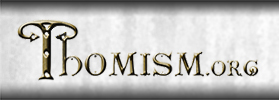
 |
Thomistic Philosophy |
FORM : That which makes something the kind of thing it is
Note: In the case of material beings, such forms are said to "organize" or "structure" or "inform" matter, which is the basis for making a material thing what it is
(e.g. the form of a bronze statue as distinct from its bronze matter) Click to Expand ⤵
- Substantial Form (a.k.a. The Form of a Substance)
The form of a thing that exists in itself (or by itself)
(e.g. the form of an atom, the form of a tree, the form of an elephant, the form of a human) ⤵
- Concrete Substance (a.k.a. Individual Substance or Primary Substance or First Substance)
A particular existing substance (in which case, a substantial form is combined with some particular matter, at least in the case of material substances)
(e.g. the form of human as it exists in George Washington)
- Abstract Substance (a.k.a. Universal Substance or Secondary Substance or Second Substance)
A substance considered abstractly only as its pure form apart from any existing matter (and thus not limited to any particular material thing)
Note: Arisotle considered this "second" because it comes from concrete substances, which would then be "first" (that is, we first encounter concrete substances and from them we conceive of abstract substances)
(e.g. the form of human that all humans have ... humanity in general)
- Accidental Form (a.k.a. The Form of an Accident)
The form of a thing that exists in another (ultimately, in another substance)
(e.g. blue, smooth, walking, health, etc.) ⤵
- Concrete Accident
A particular existing accident (in which case, an accidental form is combined with some particular matter)
(e.g. the form of running as it exists in the moving body of a runner)
- Abstract Accident
An accident considered abstractly only as its pure form apart from any existing matter (and thus not limited to any particular material thing)
(e.g. the form of running ... in general)
MATTER : That out of which something is made (or simply "what a thing is made of")
(e.g. the bronze of a statue) Click to Expand ⤵
- First Matter (a.k.a. Primary Matter or Prime Matter or Primal Matter or Primordial Matter)
Matter considered entirely distinct from any forms ("matter without form")
Note: There is controversy over how Prime Matter can be said to exist precisely, but the argument is generally that as you look at the matter of a chair, for example, which could be wood, that wood possesses its own form that makes its wood; if you look at the matter that makes up the wood, you can say that atoms, for example, are a matter that compose it; but atoms themselves have their own form that make them atoms; an atom's matter can be said to be electrons, protons, and neutrons, all of which in turn have their own form with their matter being quarks; however, there must exist "at the bottom" some pure matter without form, otherwise only forms (of forms) would ultimately exist and matter ultimately would not (thus making material things ultimately lack materiality, which seems absurd)
- Second Matter (a.k.a. Secondary Matter)
Matter composed of actually existing substances ("matter with form")
(e.g. the wood of a door, the metal of a knife, the glass of a window)